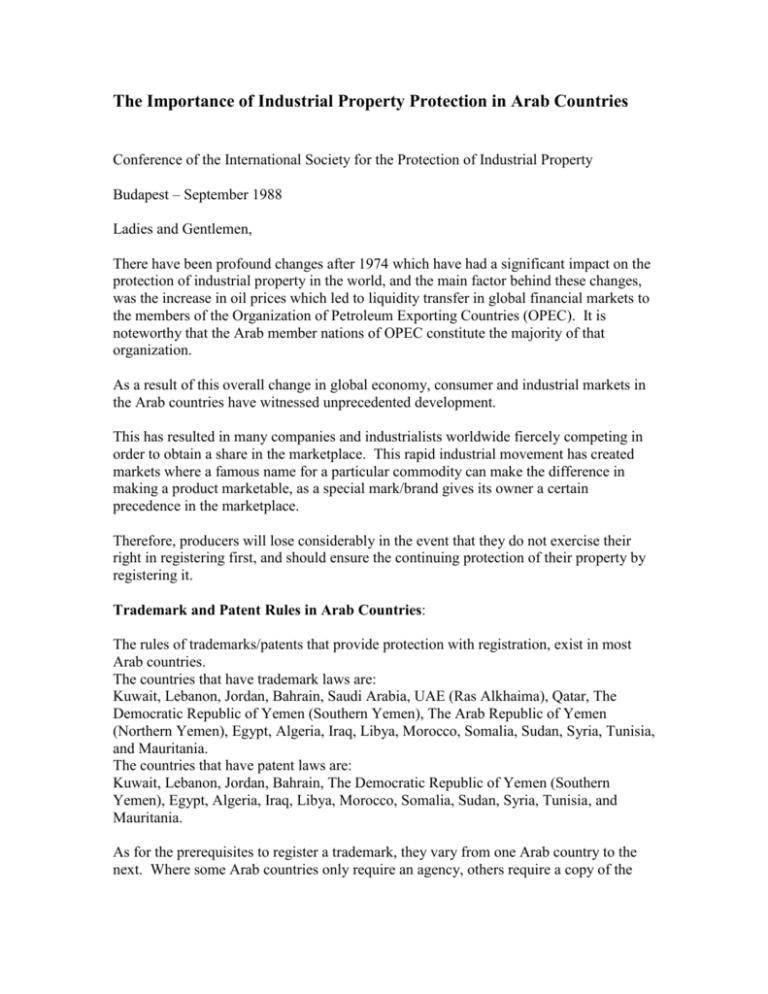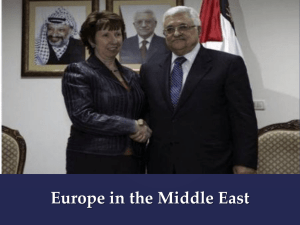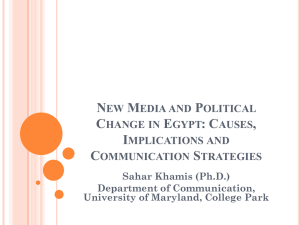The Importance of the Protection of Industrial Property in Arab
advertisement

The Importance of Industrial Property Protection in Arab Countries Conference of the International Society for the Protection of Industrial Property Budapest – September 1988 Ladies and Gentlemen, There have been profound changes after 1974 which have had a significant impact on the protection of industrial property in the world, and the main factor behind these changes, was the increase in oil prices which led to liquidity transfer in global financial markets to the members of the Organization of Petroleum Exporting Countries (OPEC). It is noteworthy that the Arab member nations of OPEC constitute the majority of that organization. As a result of this overall change in global economy, consumer and industrial markets in the Arab countries have witnessed unprecedented development. This has resulted in many companies and industrialists worldwide fiercely competing in order to obtain a share in the marketplace. This rapid industrial movement has created markets where a famous name for a particular commodity can make the difference in making a product marketable, as a special mark/brand gives its owner a certain precedence in the marketplace. Therefore, producers will lose considerably in the event that they do not exercise their right in registering first, and should ensure the continuing protection of their property by registering it. Trademark and Patent Rules in Arab Countries: The rules of trademarks/patents that provide protection with registration, exist in most Arab countries. The countries that have trademark laws are: Kuwait, Lebanon, Jordan, Bahrain, Saudi Arabia, UAE (Ras Alkhaima), Qatar, The Democratic Republic of Yemen (Southern Yemen), The Arab Republic of Yemen (Northern Yemen), Egypt, Algeria, Iraq, Libya, Morocco, Somalia, Sudan, Syria, Tunisia, and Mauritania. The countries that have patent laws are: Kuwait, Lebanon, Jordan, Bahrain, The Democratic Republic of Yemen (Southern Yemen), Egypt, Algeria, Iraq, Libya, Morocco, Somalia, Sudan, Syria, Tunisia, and Mauritania. As for the prerequisites to register a trademark, they vary from one Arab country to the next. Where some Arab countries only require an agency, others require a copy of the company’s registration. The same applies to registering a company and registering patents, in addition to the request for an agency and a copy of specifications. Most Arab nations follow the international categorization of goods and services, with the exception of Iraq, where there is a local categorization. Some Arab countries accept applications for the registration of alcoholic beverage trademarks, whereas others do not. In Kuwait, Category 34 of the international categories was deleted, and registration of smoking paraphernalia occurs in Category 33. Also, in Northern Yemen, smoking paraphernalia is registered under Category 33, and Category 34 is used for “miscellaneous” items. In the categorization used in Ras Alkhaima, there is no Category 33. Applications for registration of service marks are accepted in the following Arab countries: Algeria, Bahrain, Egypt, Lebanon, Libya, Morocco, Mauritania, Qatar, UAE (Ras Alkhaima), Saudi Arabia, Sudan, Syria, Tunisia, The Democratic Republic of Yemen (Southern Yemen), and The Arab Republic of Yemen (Northern Yemen). As for the Arab nations that signed the Paris Agreement, they are: Algeria, Bahrain, Egypt, Iraq, Lebanon, Libya, Morocco, Mauritania, Syria, and Tunisia. Some countries obtained membership in the World Intellectual Property Organization (WIPO), and they are: Jordan, UAE, Tunisia, Algeria, Libya, Sudan, Iraq, Qatar, Egypt, Morocco, Saudia Arabia, and the Arab Republic of Yemen. Upcoming Legislation in Arab Countries: Regulations for trademarks and patents will be put in place and executed in all Arab countries at the appropriate time. As for the Arab countries that don’t have these regulations, WIPO and the Industrial Development Centre for Arab Nations and the Arab Society for Protection of Industrial Property are assisting in putting them in place. Publishing Cautionary Notices in Arab Countries: In Arab countries where trademark/patent laws do not exist, the only way to protect industrial property is through the advertisement of cautionary notices in local publications. Cautionary notices define the rights of the trademark owner for his/her trademark that is publicized, and informs the public about the owner and warns the public about any potential misuse of the mark. With the absence of trademark & patent laws where an official registration can be obtained, the cautionary notice is considered the only method of providing supporting evidence in the case of a legal dispute. In Arab countries where this is applicable, advertising these notices in both Arabic and English languages provides the maximum protection and advertising in Arabic is, of course, due to the fact that it is the official language and that which is understood by businesspeople and the public. Also, advertising in English is important as well, to inform consultants, businesspeople, and other non-Arabs. The current cost to advertise in both languages is justified by the extra protection this ensures trademark and patent owners. Re-advertising Cautionary Notices: Cautionary notices are ineffective when it comes to such issues as registration, and are usually not filed or stored by any governmental department. Accordingly, it is advisable to re-advertise time and again, because doing so reminds the public of the (owner’s) rights and also warns against misuse for those who didn’t see the first ad. There is no law that specifies a period in which the notice must be re-advertised, but it is advisable to do so once every two years, and this of course is up to the discretion of the mark’s owner. Arab Countries Where Cautionary Notices are Published: Below is the list of countries where advertising a cautionary notice is considered the only method of protecting industrial property: UAE (Dubai, Abu Dhabi, Alsharqah, Ajman, Alfujeira, Um Alquwein, Ras Alkhaima. Also, cautionary notices are only related to patents in Ras Alkhaima), Sultanate of Oman, Qatar (related to patents only), Saudi Arabia (for patents), and the Arab Republic of Yemen (for patents). The Issue of Boycotting Israel: As a result of the ongoing conflict between Arabs and Israel, numerous procedures have taken place that effectively prevent normal people and institutions to deal directly or indirectly with people or companies that are either headquartered in Israel or work for Israel’s benefit inside or outside Israel. These preventive procedures apply to numerous aspects of industrial property including registration of patents and trademarks or industrial designs, and other procedures that are also related to registration renewal or waivers of properties and licenses. For the purpose of supporting the boycotting of Israel, law with multiple dimensions has been enacted, and an office for boycotting Israel and applying boycott procedures is being implemented through the office’s branches in numerous Arab countries. This way, those individuals or institutions that violate these boycott regulations will be placed on a boycotted list. The result is the illegality of dealing with them, in addition to applying penalties on them for their violation(s). Those placed on this list are permitted to appeal this decision with the boycott office if they feel that they’ve been unjustly treated, or if they have ended their dealings with Israel. As a result of this, American organizations and individuals placed on this list are not prevented from removing their names from it, which represents a first step towards their re-qualification. Before applying for registration of industrial property rights in Arab countries, the registration agent is asked to submit the application on behalf of his/her client, to obtain the approval of the boycott office. The procedures for the application’s approval by the boycott office take place in the respective Arab countries, except for Iraq, and require the applicant’s name and address. These procedures therefore do not contradict the antiboycott regulations such as those that are applied in the USA. The application for the approval of the Iraqi embargo office comes in the form of a questionnaire of 8 points that are inclusive of the agency granted to the registration agent by the applicant. As for the other Arab countries, these questions are only required of marks’ owners that are on the boycott list, whose status is uncertain or are applying for the first time. Information such as the number and date of deposit in any Arab country is considered satisfactory at the Jordan boycott office, with no need for the owner to forward the regular boycott declaration. Further, the placement on or off the embargo list for individuals or entities is published frequently in numerous Arab nations, due to the continuous changes to this list, and the industrial property registration agent must obtain the boycott office’s approval at every new registration. Imitation Prevention Procedure in Arab Countries: Foreign companies can take legal procedures against those who copy/imitate their trademark/patent, if said trademark/patent is registered in countries that do not have industrial property laws, and that is through publishing cautionary notices. Due to the tendency of imitators to place copied products under a well-known brand name by using the mark in Arabic, it is advisable to register the trademark in Arabic and in Latin as well. The trademark owner can sue the imitator in a court of law on the basis of ownership of the trademark that includes a registration certificate or copy of the published cautionary notice, and forwarding a model for the original and imitated products, along with a receipt from the seller that mentions the trademark name. A chemical analysis must be conducted related to perfumes, shampoo, and other beauty products, or a technical report for machinery parts, car parts, locks, etc.., to determine the inferior quality of the imitated products. The court may issue a judgment that prevents importing more products, in addition to forcing the importer to compensate the plaintiff for his/her loss in sales or the damage arising from the discrediting of his/her trademark. If the plaintiff however fails in convincing the court that imitation has taken place, and primarily failed in proving that the imitated products are of inferior quality, then the court may judge in favor of the defendant, in which case he/she can continue to import and sell these products. Latest Developments in Trademark Regulations: The publication of issue 369 dated October 15, 1987 of the official Omani newspaper contained Omani law for trademarks and brand names, which was issued based on the Sultanate’s request # 68/87 dated October 5, 1987 and became enacted officially. The law provides trademark protection via official registration, to replace the current method of publishing cautionary notices. And although the new law took effect when it was published officially on October 15, 1987, the executive procedures related to the prerequisites of trademark registration in the Sultanate of Oman are still under review. Therefore, it is strongly advisable that trademark owners continue to protect themselves via advertising with cautionary notices during this transition period, until the new law is finalized. This is due to the difficulty in predicting when depositing registration applications will commence in the Sultanate of Oman. Qatar and the Arab Republic of Yemen are some of the countries that have recently enacted trademark law. It took a couple of years to get this law implemented in Qatar as well as the Arab Republic of Yemen, which leads to the assumption that a similar timeframe may be needed in Oman. Based on this, the publishing/advertising of cautionary notices remains the only way to ensure trademark protection during the transition period.







